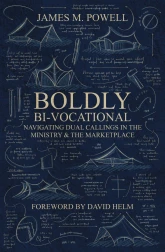Bi-vocational ministry is not part-time ministry
Bi-vocational ministry isn't "part-time" pastoring but strategic kingdom work—living Paul's example of making tents while preaching gospel with undivided, full-time devotion to Christ.

For more than a decade, I served as a pastor within a traditional model of ministry. Through a series of providences, in the Fall of 2012 I was led to voluntarily step outside of the familiar and to live out my calling as a tentmaker, which later morphed into a strategic bi-vocational life. Since that change, I have simultaneously worn the hat of pastor and nonprofit executive. Through this duality, God has enabled me to live a single life of mission in an expanded “assigned sphere of influence” (2 Corinthians 10.13) even as he has provided for my wife and six children.
Ten years later after my paradigm transition (May 2022), while serving as an Instructor for the Charles Simeon Trust, I was questioned by a local pastor over lunch as to the specifics of my story. “How are you here as a preaching instructor, serving as the pastor of a multi-pastor church, yet bi-vocational in your local community? How does that work?” I understood the reason for his inquiry. Sitting around us were ministers from small churches across New England, many of whom he felt might be encouraged to think differently about a tent-making or bi-vocational paradigm. Most, as he saw it, viewed bi-vocational ministry as a necessity to be endured, hurried to a terminus as soon as a pastor was able to transition to “full time ministry.” These brothers were burdened by a “part-time” pastoral reality. But is it?
The conversation provided yet another opportunity for me to press into 1 Corinthians 9, wherein the Apostle Paul reiterates the Lord’s command that “those who proclaim the gospel should get their living by the gospel” (9:14). Reflecting on his own life, however, Paul presents a non-normative alternative: “But I have made no use of any of these rights. For I would rather die than have anyone deprive me of my ground of boasting” (1 Cor 9.15). Paul voluntarily gave up his right to ministerial remuneration, choosing to make his living through the work with his hands (Acts 18:3).
He made tents as he preached gospel. He preached the gospel as he made tents.
Paul was proud of his duality, and we can only assume that he made tents with the zeal with which he preached Jesus. It was his joy to entrust himself to God’s provision through a trade he had mastered in tandem with his apostolic calling – which remained his priority.
I recounted for this brother just how turbulent my ministry transition had been. The hardest challenge was not finding the “other” job that would strategically fit with vocational ministry. More challenging were my conversations with ministry peers. “So, you’re quitting?” No. “But you are wanting to be a part-time pastor?” No. I tried to reiterate that I was the same man with the same gifts who longed to serve as a pastor in a local church in the same kingdom – full time. I was not quitting.
A paradigm shift is always revolutionary. It goes against the established way of doing things. As such, it is not easily comprehended by those who are content with the status quo or for whom the mold fits. In my own story, the voluntary shift from a “successful” ministry life to a fragile and untested tent-making (or bi-vocational) model was revolutionary in my small circle of influence. Others expected me to stay where I was serving and experience growth, or “maybe even leave and go to a larger church” with a more influential pulpit. But to voluntarily step out of the paradigm was incomprehensible.
Sadly, many of the questions I was asked had an underlying assumption that to not employ a traditional or professional model of ministry was to somehow not “fully” be a pastor. “Jim, now remind me… you used to be a pastor, but now you lead charities or something?” Nope. Still a pastor. Full time, serving Christ and his church with an undivided life … within a biblical framework.
Looking back over the past dozen years, undeniably, bi-vocational ministry has provided balance in life and ministry – pushing me to live as both missionary and pastor. It has been used by God to transform my dependence on him, my preaching, my family – as well as the local church where I have served. It has changed everything. I have had one foot in two different worlds – so to speak – positioned to live a balanced and undivided life before God, with a single-minded heart that serves the sovereign kingship of God.
Teach me your way, O Lord,
that I may walk in your truth;
unite my heart to fear your name. (Psalm 86:11).
Bi-vocationalism is glorious because it is a means of God strategically deploying and providing for those he calls. Through it we get to be the aroma of Christ in places and ways that an exclusively church-employed vocational minister is unable. To put it into accounting terms, the bi-vocational minister diversifies his investment in the kingdom of Jesus.
If you are bi-vocational minister of the gospel, you are in the pipeline of God’s provision and grace! You are not a part-time minister. Live with strategic intent, fulfilling your ministry in an undivided life. Thanks be to God for his Word that informs us of this model! Boast in the Lord for your unique calling and trust that the God who has equipped you for it will provide for you through it. May no one – not even yourself – “deprive you” of your “ground for boasting” (1 Corinthians 9.15) as you navigate a sacrificial, complex and wonderful assignment from God.



